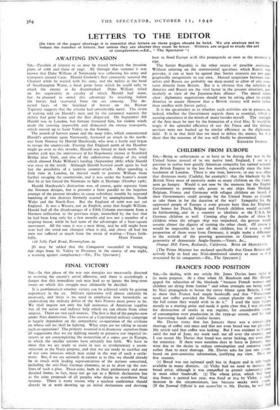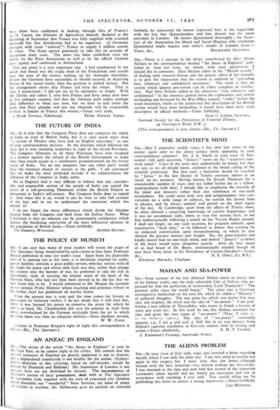FRANCE'S FOOD POSITION
Sia,—In dealing with my article Mr. Jones Davies loses sight of its main purpose. At a time when M. Baudouin and Mr. Hoover appeal for relaxation of the blockade " because French women and children are dying from famine " and when attempts are being made by Nazi propaganda to fasten the entire blame upon Britain, I tried to show that France, had ample foodstuffs and that "Frenchmen need not suffer provided the Nazis cannot plunder the country to of harvesting hands and similar factors. figures
the full extent they would wish to do it." I used the 1939 merely as a starting point and made it quite clear that I was allowing for destruction of stocks in war regions, for considerable excess of consumption over production in the 1939-40 season, and for lack
Mr. Davies states that last January there was a considtrable shortage of coffee and meat and that not even bread was too plentiful. My article said that coffee was lacking. But I was resident in France until the end of June, my work took me all over the country. and I can assure Mr. Davies that bread was never lacking, not even after the armistice. If there were meatless days in force in JanuarY- they were due to the desire to reduce consumption and conserve mocks rather than to meat shortage. Mr. Davies asks for just one reason, based on post-armistice information,- justifying my view. Here are five reasons,
(r) Bread was not rationed until late in August and is still freely available in many districts. (a) Vichy had no need to increase the bread price, although it was compelled to permit substantial rises in most other foodstuffs. (3) The wheat price, which had been 204 francs a quintal last year, was fixed at 214 by Vichy, a small increase in the circumstances, just because stocks were PrnIn (If the Journal Officiel is not accessible to Mr. Davies, he will find these three facts confirmed in looking through files of France.) (4) M. Caziot, the Minister of Agriculture himself, declared at the beginning of September that France was fully supplied with essential foodstuffs but that distribution had to be organised. (5) Germany arranged with (read "ordered ") France to supply 8 million centals of wheat. The Nazis agreed graciously to take this on account of occupation army costs. The news has been published since my article, by the Press Association as well as by the official German news agency and confirmed in Switzerland.
This last point is a very important one. I had emphasised in my article that bread was the staple food of the Frenchman and cereals were the crux of the matter, making up for shortages elsewhere. If now the Germans have succeeded, or should succeed, in depriving France of her cereal stocks, then the position is indeed serious. But the arrangement shows that France did have the wheat. That is what I maintained ; I did not try to be optimistic or bright. With Mr. Davies and others I, who love France and have many dear ones in that unhappy country, feel that the German guilt makes perhaps little difference to them , just now, but we have to nail down the truth that Nazi plunder and not our blockade will be responsible if there is famine in France this winter.—Yours very truly,



























 Previous page
Previous page